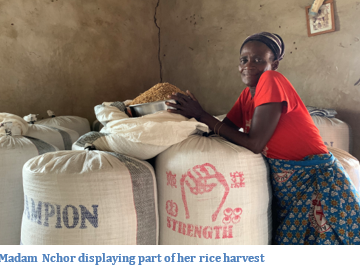Most of the players in the agricultural sector are poor or within the low-income bracket. Majority of smallholder farmers struggle to make a living from their toils.
This describes the state of Madam Apoba Nchor and over 650 members of the Akanyele Yirepogsi Association (AYA) in the Kasena-Nankani East District of the Upper East Region until over a year ago when the BUSAC Fund sponsored a training to expose members of the association to good agronomic practices, sustainable land use, cooperative development and commodity value chain.
As part of the training, financed by BUSAC Fund, DANIDA and USAID, value chain actors were brought together to interact and create a formal channel to improve livelihoods.
Right from the beginning of the season, the group established a link with tractor operators, inputs dealers and aggregators who were ready to buy their produce after harvest.
Madam Nchor, the leader of the women group who spoke highly of the training, said she put into practice the use of certified seeds, planting in rows and timely application of fertilizer. “I used to broadcast my saved seeds on the field and also did not apply fertilizer on time. Now I prepare a nursery with certified seeds, transplant in rows and apply the fertilizer at the right time. My way of harvesting has also changed from late to early harvesting,” she noted. At the end of the season, she harvested 30 (100 KG) bags of rice from her paddy of two-acres as compared to the nine bags the year before.
Her two-acre maize farm also yielded 24 (90 KG) sacks compared to five (5) sacks in the preceding year while the groundnut fetched her three (90 KG) sacks as compared to half a sack due to disease infection. According to Madam Nchor, she recorded her highest yield ever, which amounted to GHC 6,844 compared to GHC 1,690 gotten from the previous season. “My life has improved, I can afford to buy and eat what I want and most importantly take care of my children as a single mother and support my family”, she stated.
Mr Isaac Amongba, Assembly Member of the area, noted that until the BUSAC Fund sponsored training for members of AYA, the majority of women could not afford three-square meals daily. “Now at least over 400 women get good yields from their maize and groundnut farms. Their livelihoods have improved”, he stated. He added that the marketing of the rice was not difficult due to an earlier arrangement with some aggregators.
The group has also begun operating a village savings and loans scheme to help members in need.










